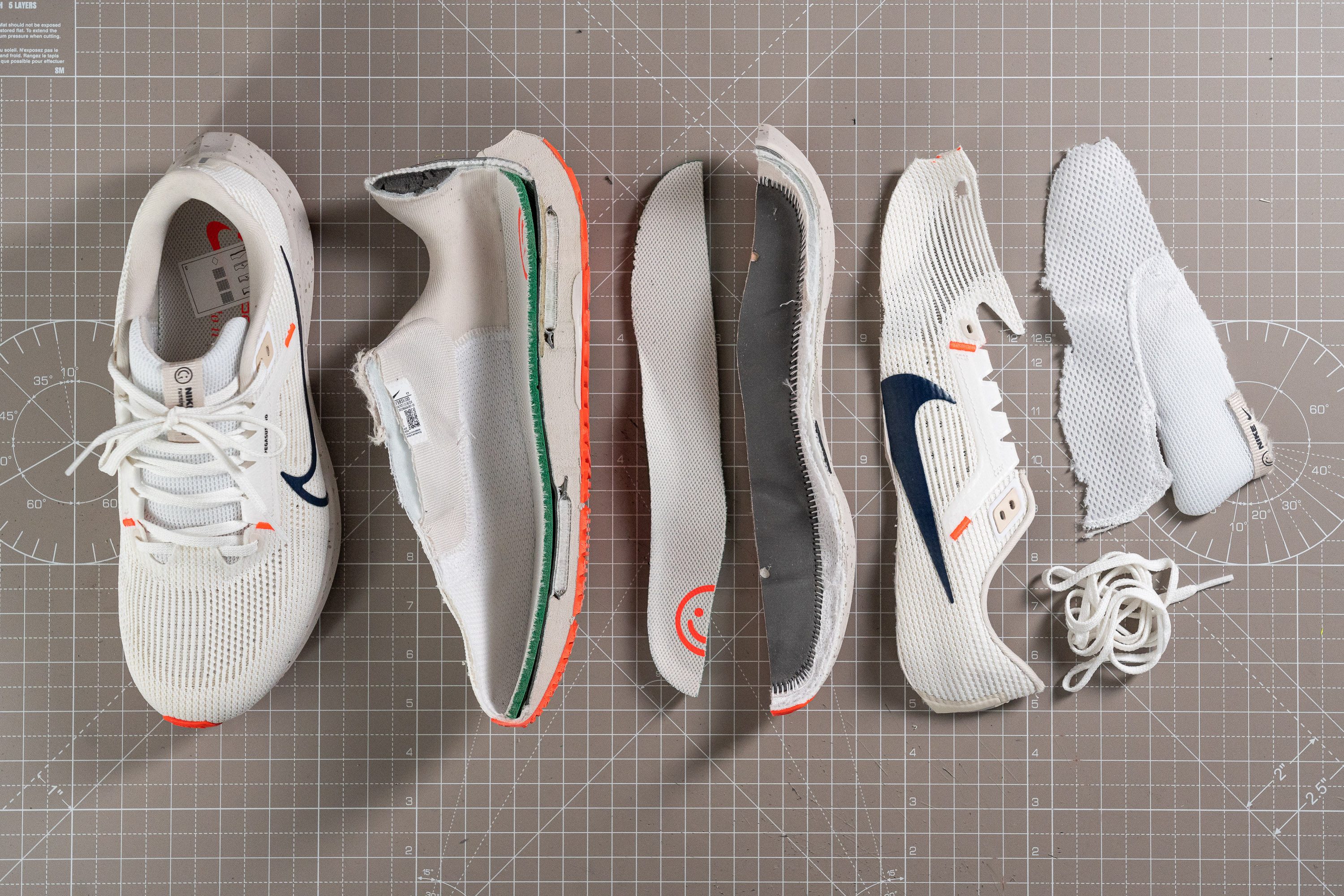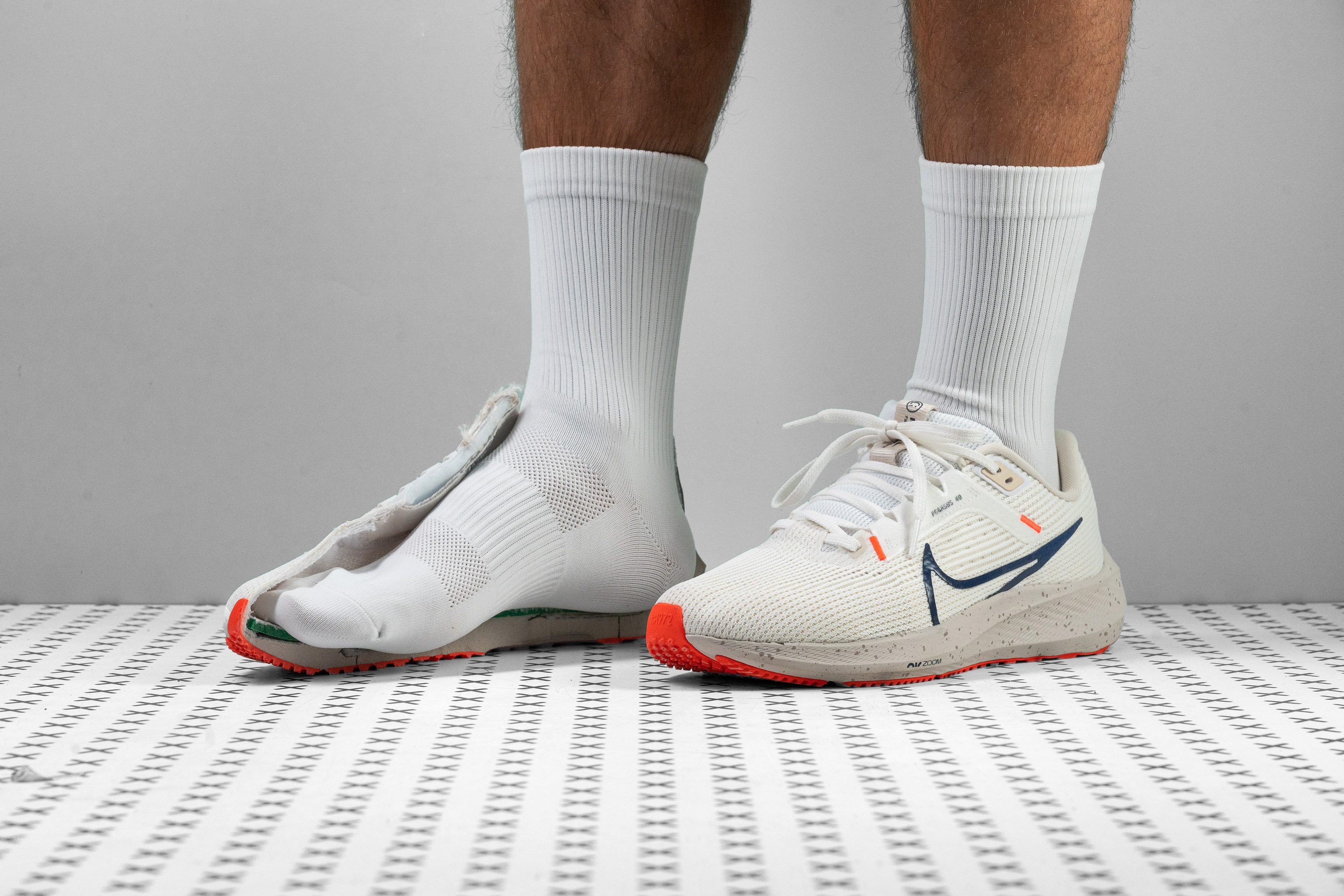Our verdict
- Top pick in best running shoes for high arches (2024)
- Top pick in best running shoes for orthotics (2023)
Pros
- Plush and comfortable upper
- Breathable
- Secure lockdown
- Has enough toe-box space
- Not overly soft or firm underfoot
- Good energy return in the forefoot
- Great grip on most surfaces
- Incredible durability
- Perfect for everyday miles
Cons
- A generally narrow fit
- Heavier than the v39
- Not a very memorable ride
Audience verdict
- Top 16% most popular running shoes
Comparison
The most similar running shoes compared
+ + Add a shoe | |||||
|---|---|---|---|---|---|
| Audience score | 86 Good! | 88 Great! | 77 Decent! | 85 Good! | |
| Price | $130 | $140 | $75 | $65 | |
| Pace | Daily running | Daily running | Daily running | Daily running | |
| Shock absorption | Moderate | Moderate | Moderate | Moderate | |
| Energy return | Moderate | Moderate | Low | Low | |
| Traction | High | Low | Moderate | Low | |
| Arch support | Neutral | Neutral | Neutral | Neutral | |
| Weight lab Weight brand | 9.7 oz / 275g 9.7 oz / 275g | 9.9 oz / 281g 10 oz / 283g | 9.3 oz / 265g 9.4 oz / 267g | 9.7 oz / 275g 10.7 oz / 303g | |
| Drop lab Drop brand | 9.7 mm 10.0 mm | 11.4 mm 10.0 mm | 10.1 mm 10.0 mm | 9.4 mm 10.0 mm | |
| Strike pattern | HeelMid/forefoot | Heel | Heel | HeelMid/forefoot | |
| Size | True to size | True to size | Slightly small | True to size | |
| Midsole softness | Soft | Soft | Balanced | Balanced | |
| Difference in midsole softness in cold | Small | Normal | Small | Small | |
| Toebox durability | Decent | Decent | Decent | Bad | |
| Heel padding durability | - | Good | Good | Bad | |
| Outsole durability | - | Good | Good | Decent | |
| Breathability | Moderate | Moderate | Moderate | Moderate | |
| Width / fit | Medium | Medium | Medium | Wide | |
| Toebox width | Medium | Medium | Medium | Medium | |
| Stiffness | Moderate | Flexible | Moderate | Moderate | |
| Torsional rigidity | Flexible | Flexible | Moderate | Flexible | |
| Heel counter stiffness | Flexible | Stiff | Moderate | Moderate | |
| Heel lab Heel brand | 30.2 mm 33.0 mm | 33.6 mm 37.0 mm | 32.2 mm 32.0 mm | 31.2 mm 33.0 mm | |
| Forefoot lab Forefoot brand | 20.5 mm 23.0 mm | 22.2 mm 27.0 mm | 22.1 mm 22.0 mm | 21.8 mm 23.0 mm | |
| Widths available | NormalWideX-Wide | NormalWideX-Wide | NarrowNormalWideX-Wide | NormalWide | |
| Orthotic friendly | ✓ | ✓ | ✓ | ✓ | |
| Season | All seasons | All seasons | All seasons | All seasons | |
| Removable insole | ✓ | ✓ | ✓ | ✓ | |
| Ranking | #407 Bottom 40% | #128 Top 34% | #352 Bottom 8% | #203 Bottom 46% | |
| Popularity | #103 Top 16% | #10 Top 3% | #57 Top 15% | #113 Top 30% |
Who should buy
This Nike staple is an ideal option for:
- Pegasus fans who missed out on upgrading to the 39.
- Beginners looking for their first road running shoe.
- Runners who need a reliable workhorse in their rotation.
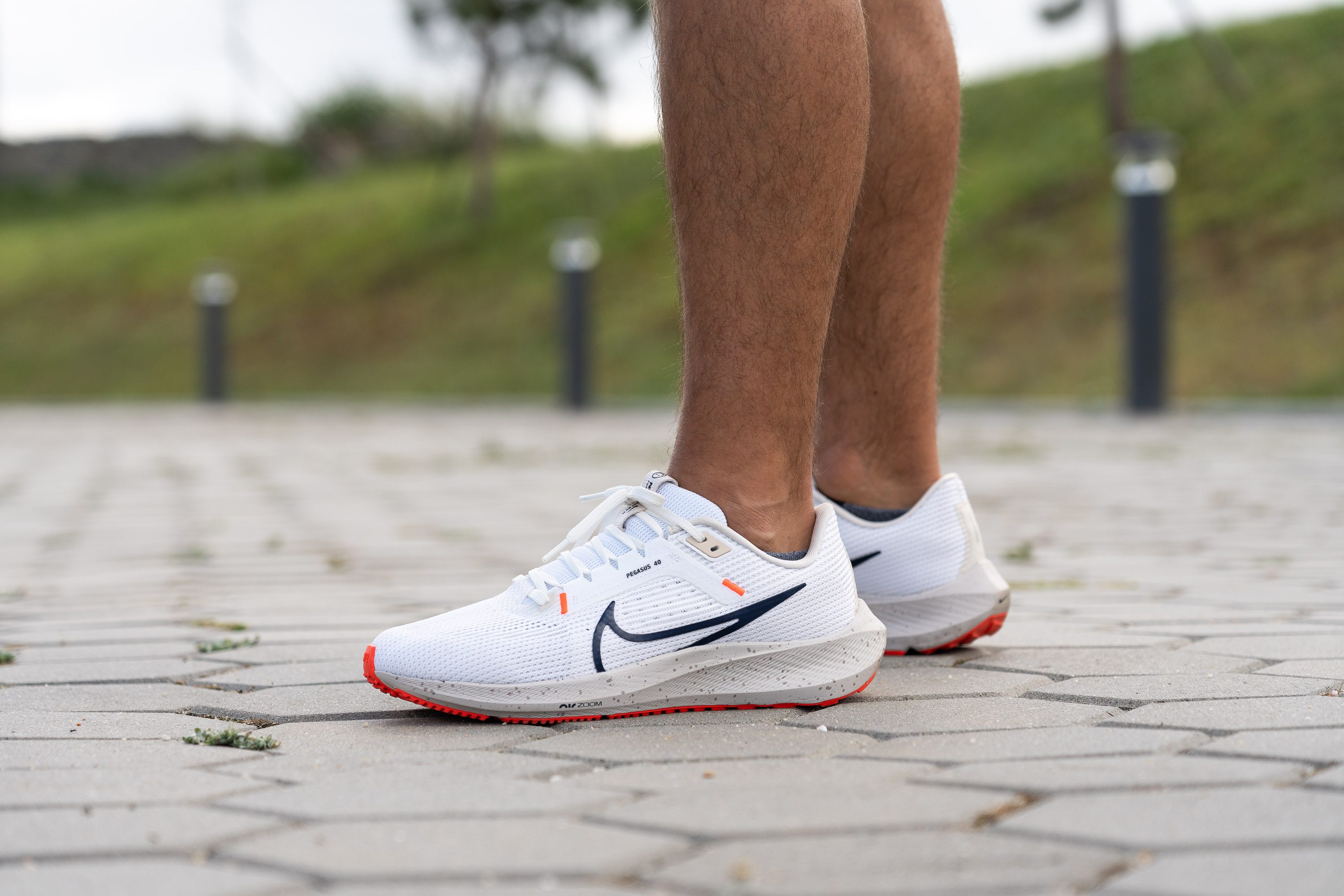
Who should NOT buy
Runners in need of a daily trainer that can get their hearts pumping with excitement should instead reach for something like the Hoka Clifton 9.
For those looking for a wider-fitting Nike runner, check out the Infinity Run 3.
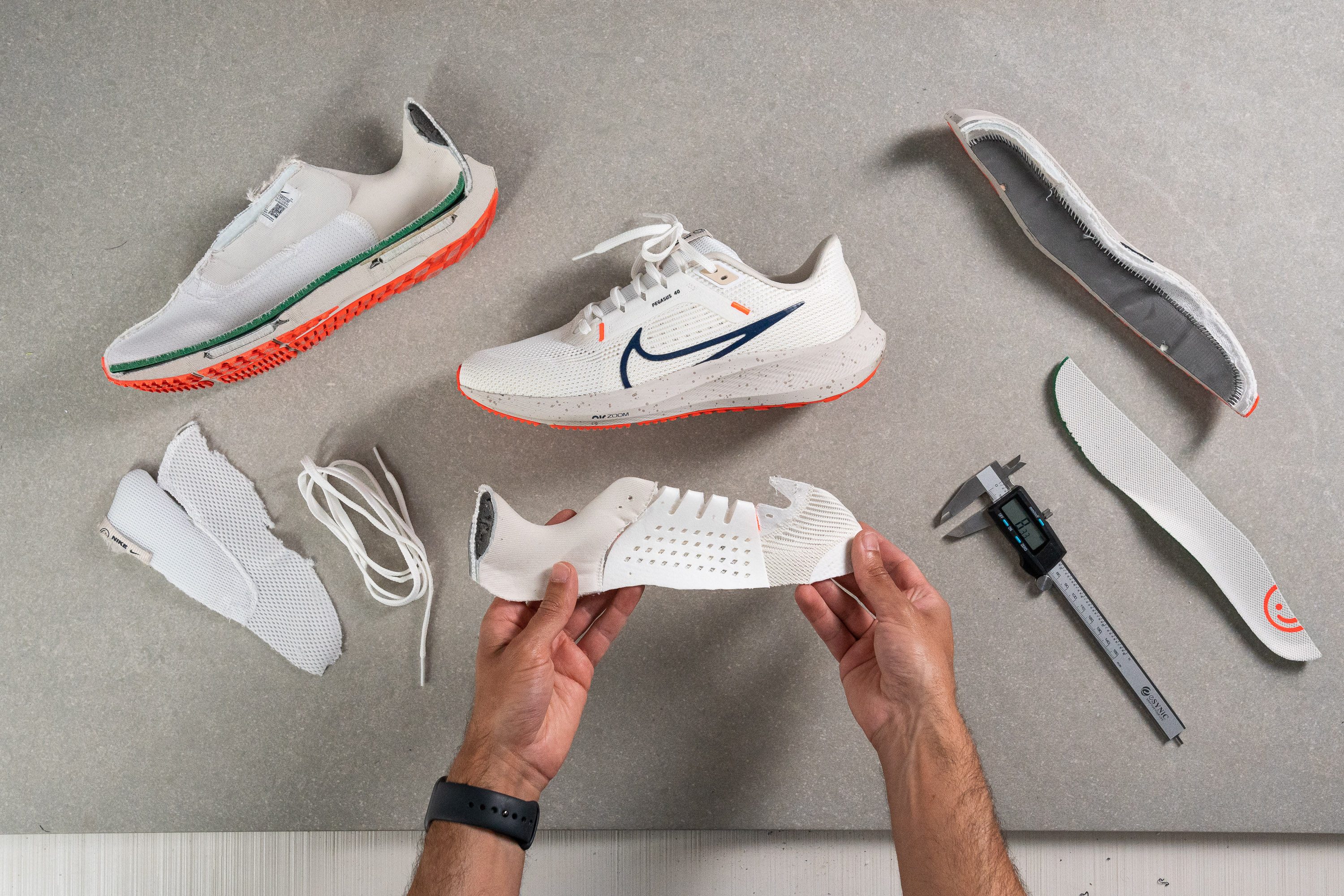
Cushioning
Shock absorption
Don’t expect an ultra-cushioned ride with the Pegasus 40—that’s not what Nike designed it for.
With just 113 SA in the heel and 86 SA in the forefoot, it delivers a more classic, low-cushion feel. If you’re after a plush, pillow-like experience, the Vomero 18 will be a better fit for you.
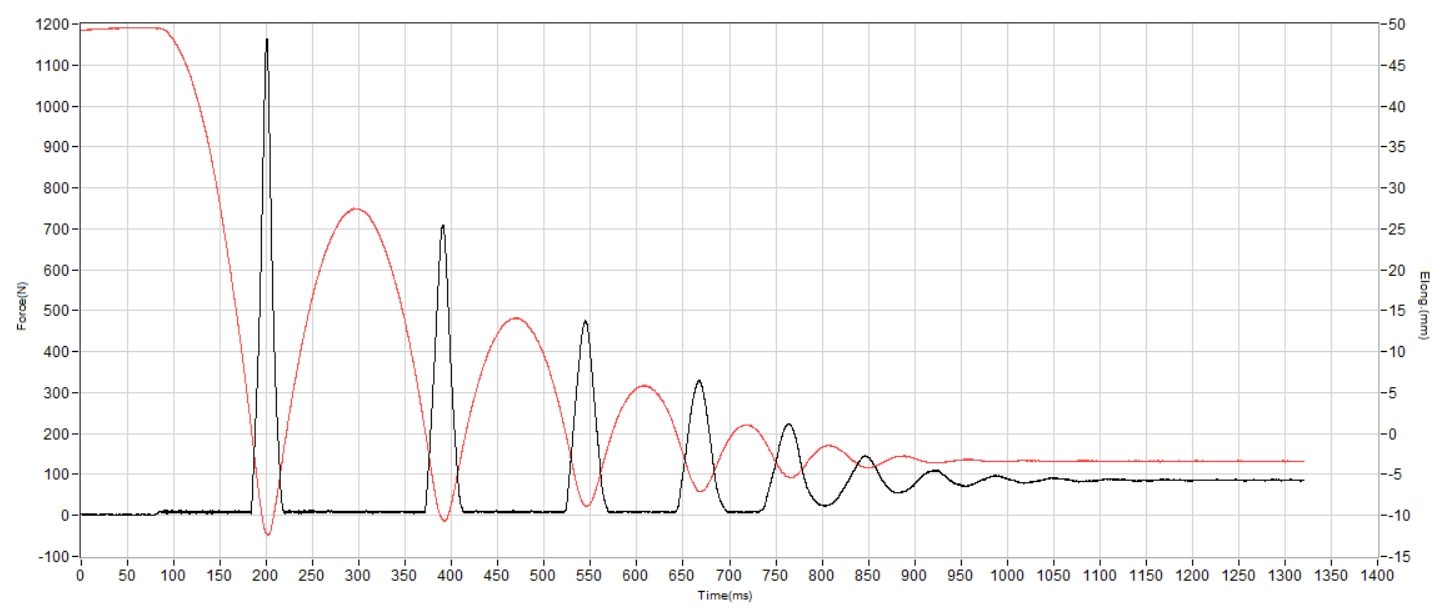
| Pegasus 40 | 113 SA |
| Average | 130 SA |
Energy return
The Pegasus 40 delivers adequate energy return in the heel at 55.2%, but steps it up with 61.5% in the forefoot. That lines up well with our running experience—it felt more responsive up front, likely due to a better balance between the Air Zoom unit and the surrounding foam.
| Pegasus 40 | 55.2% |
| Average | 58.6% |
Heel stack
The Nike Pegasus 40 is not among the cushiest trainers these days, but it surely has enough protection for most distances up to half-marathon.
Using our caliper, we measured 30.2 mm of stack in the shoe's heel. This is about 3 mm lower than average.
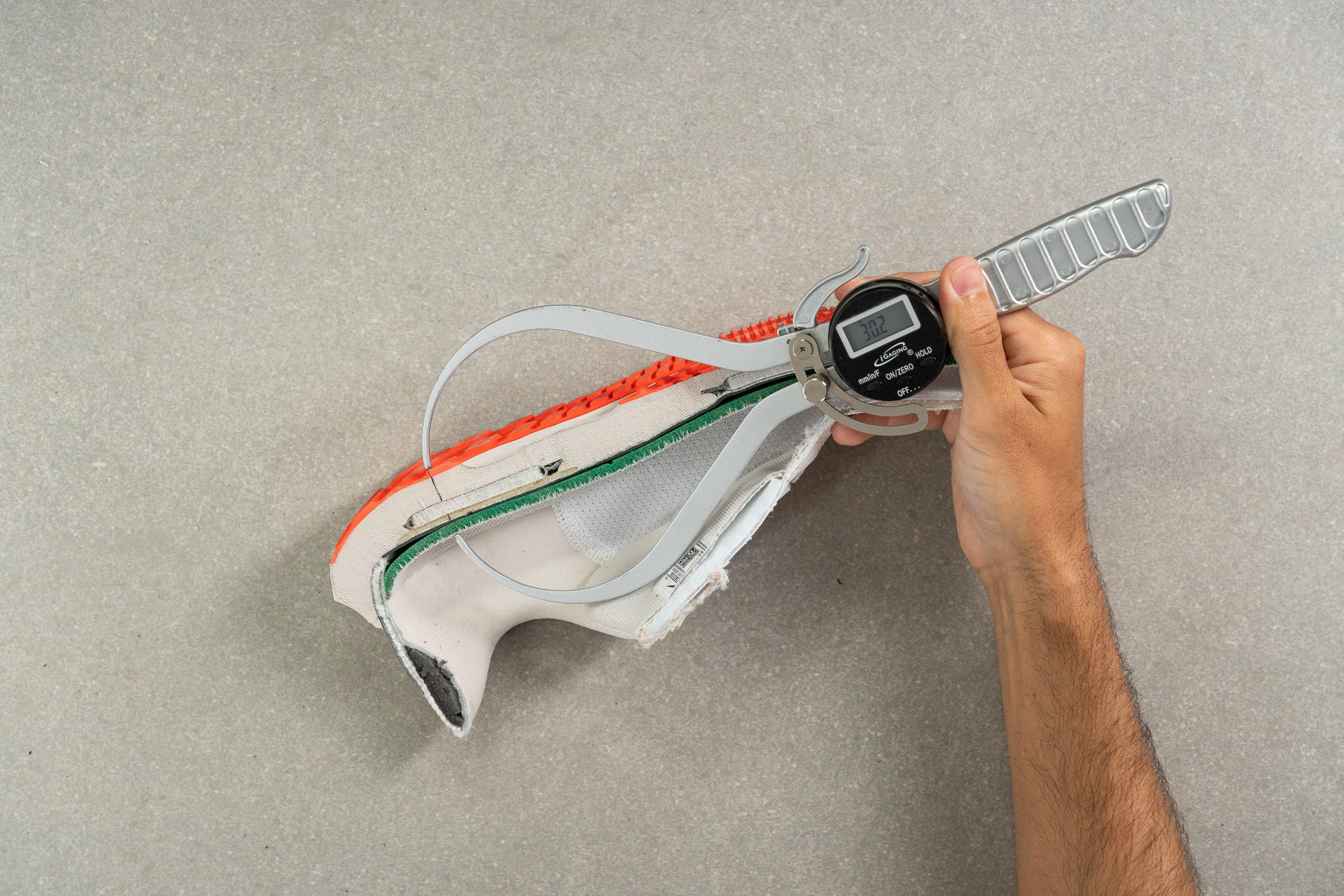
| Pegasus 40 | 30.2 mm |
| Average | 34.8 mm |
Forefoot stack
In the forefoot, the shoe's platform gets even lower than average. Showing 20.5 mm on the caliper, it is 4 mm thinner than the average road shoe stack.
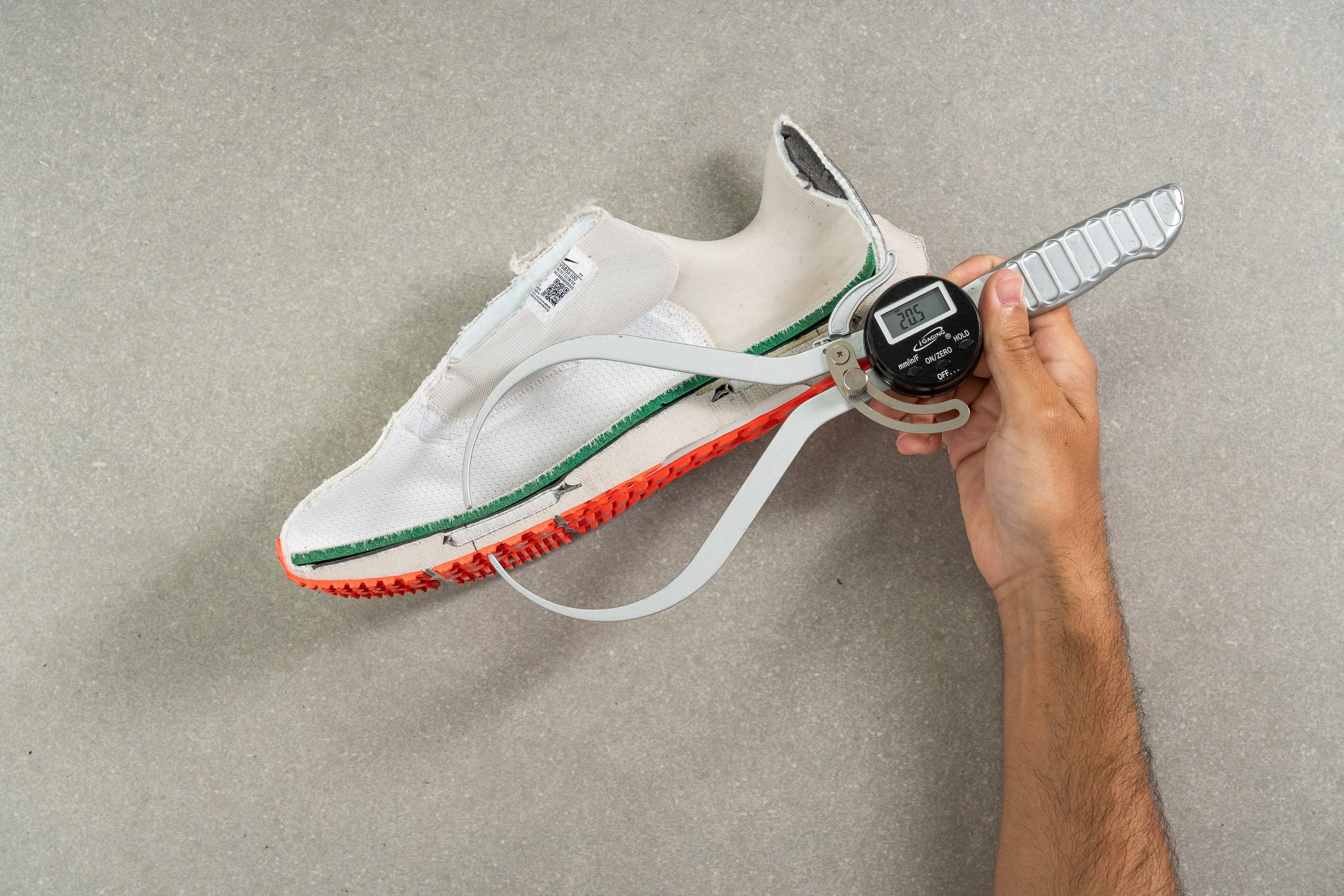
| Pegasus 40 | 20.5 mm |
| Average | 26.2 mm |
Drop
Pegasus fans love the 10-mm drop, as it's a relief for the Achilles tendon and works great for heel strikers, which account for most of the Pegasus sales.
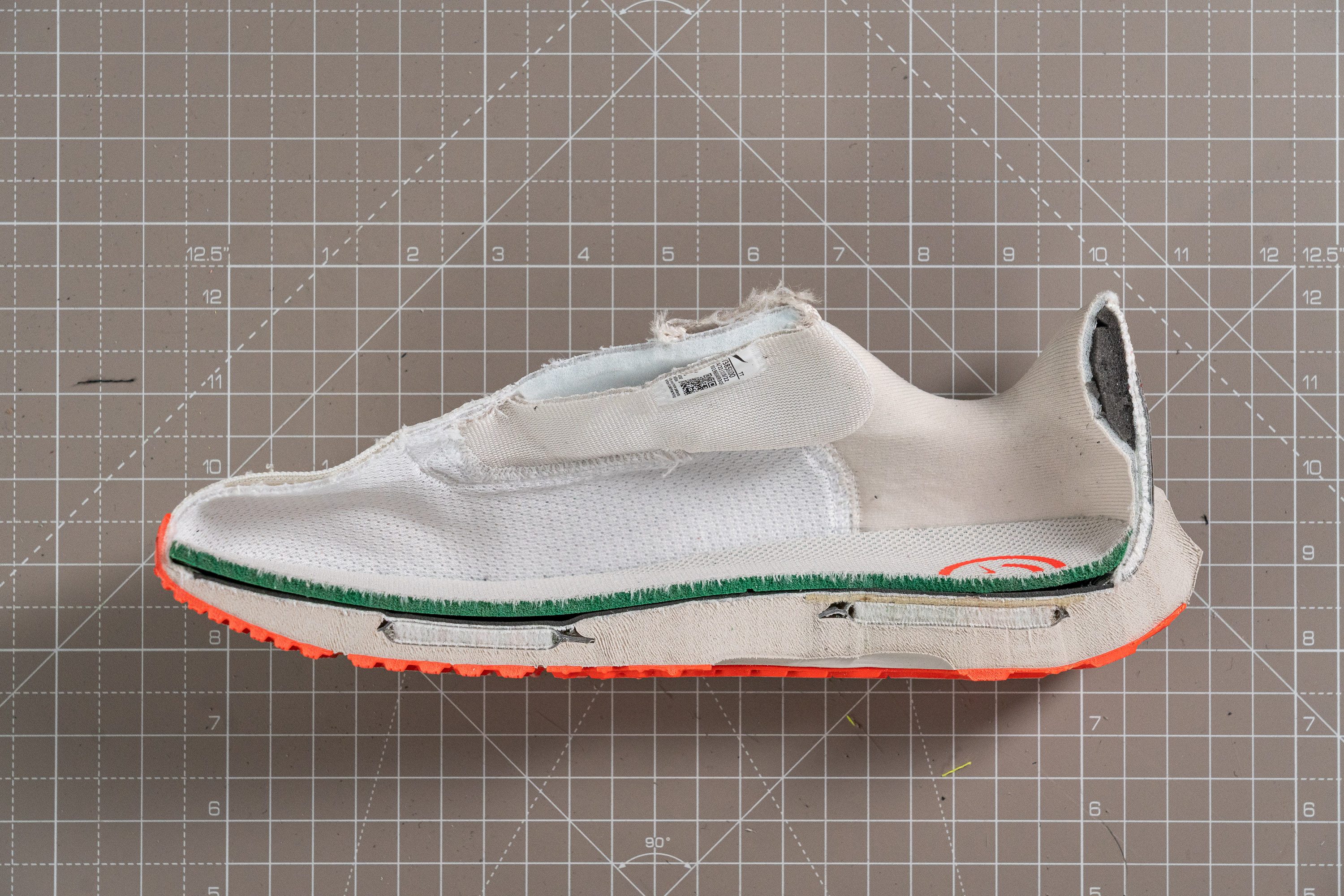
Based on our own measurements of the shoe's stack height, we got a 9.7 mm drop in the Pegasus 40. Almost precisely as stated!
| Pegasus 40 | 9.7 mm |
| Average | 8.6 mm |
Midsole softness
The Peg 40 retains the exact same midsole as the previous year’s model, with two Air Zoom units embedded within its React foam. This foam is based on TPE, a compound renowned for its durability. By the way, if you want to delve deeper into foams and midsoles, check our in-depth foams guide.
We have found that these two elements complement one another very well to provide a moderately cushioned experience, mild stability, adequate ground feel, and a good bit of energy return.
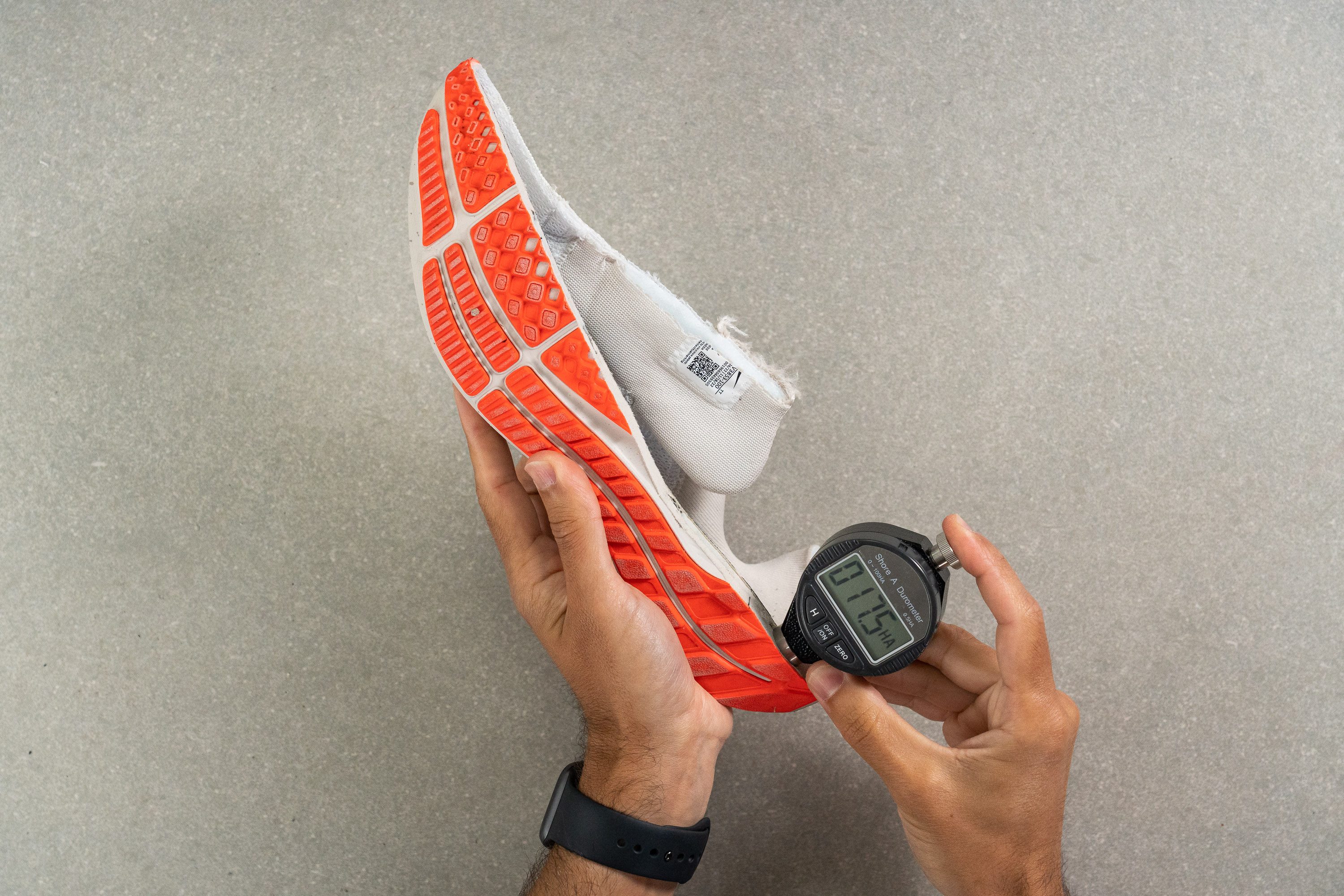
Although React will never match the crazy bounciness of Pebax-based ZoomX, the v40 scored 17.6 HA in our durometer test, placing this shoe among the top 18% of softer shoes we've ever analyzed in our lab. So yes, it does offer a somewhat plush feel, although not as much as a Nike Invincible 3.
| Pegasus 40 | 17.6 HA |
| Average | 20.4 HA |
Ride
Still the Toyota Camry of shoes.
Overall, we don't think that there’s anything truly wrong with the v40’s ride. It just wasn't that exciting or energetic.
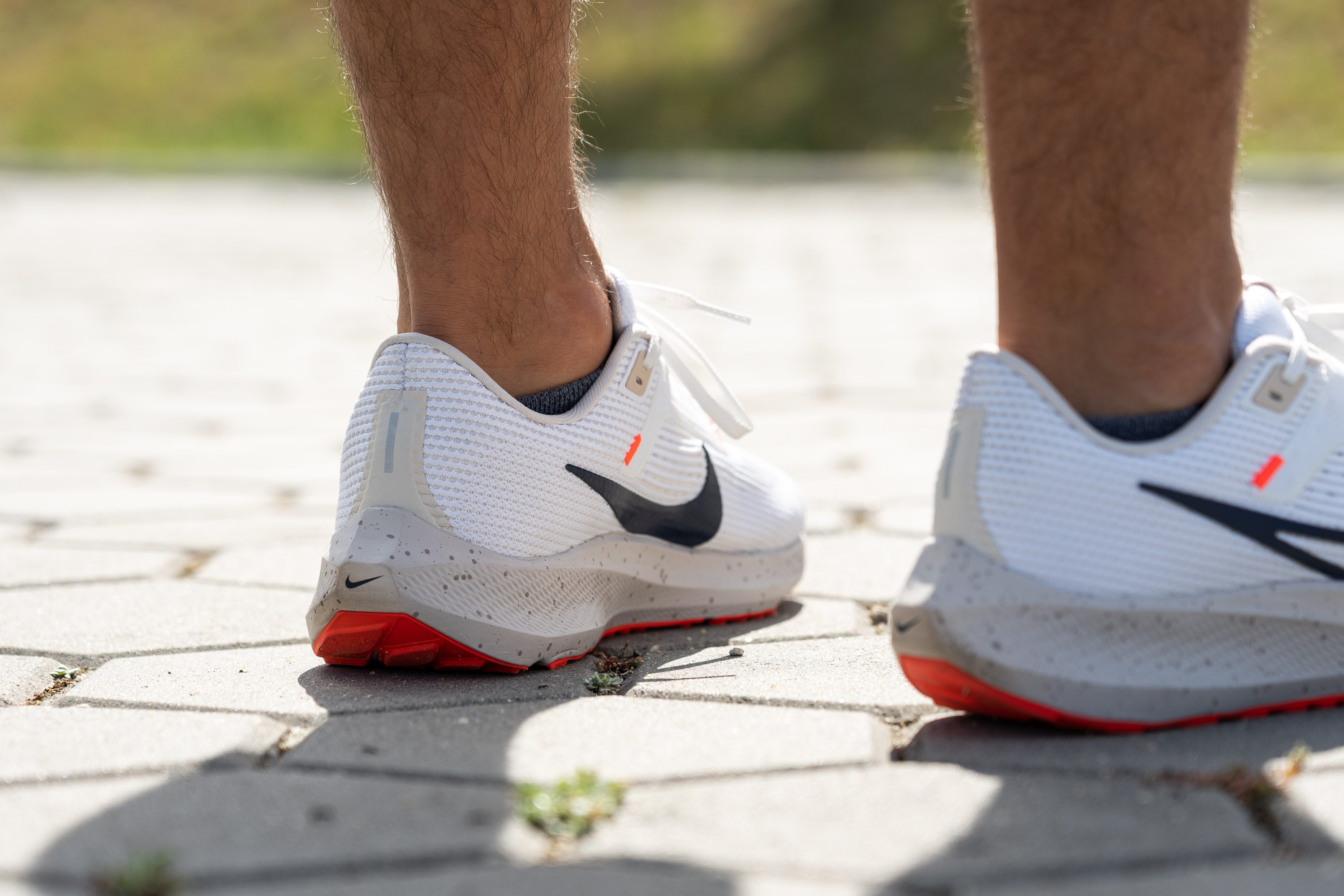
Sure, the Air Zoom units can pack a punch when pushed and the shoe really feels stable, but they weren’t enough to compensate for the overall weight gain.
This makes for a shoe that’s comfortable enough for long distances and responsive enough for shorter speed bursts but is still best for clocking up the miles. In other words, it’s a pure daily workhorse, with a non-rockered ride just as you expect in a Pegasus.
Size and fit
Size
Nike Pegasus 40 fits true to size (81 votes).
Toebox width - widest part
Although the Pegasus 40 is a rather close-fitting shoe, we found that its forefoot wasn’t too cramped for a medium-sized foot.
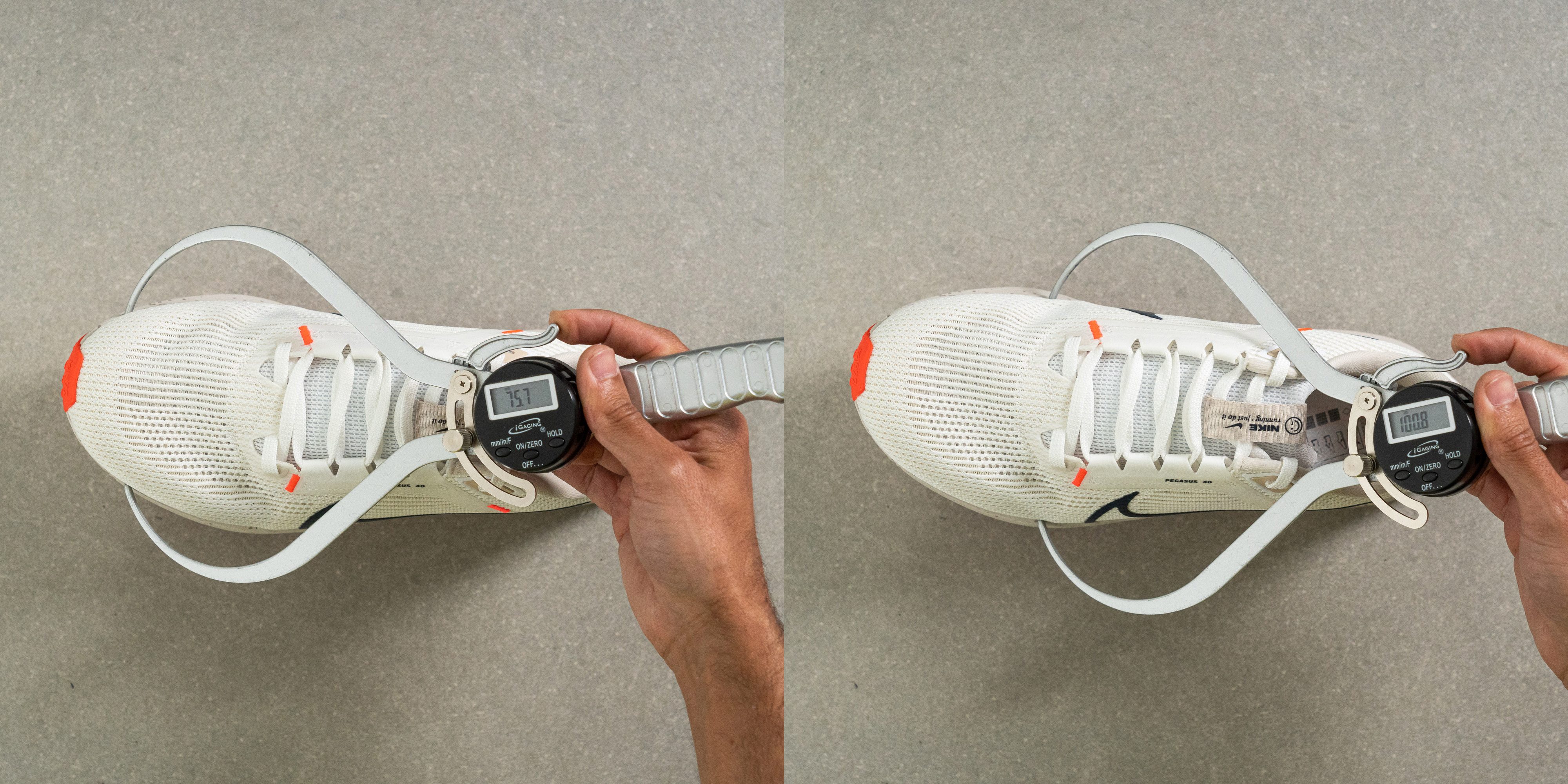
Our toebox measurements also confirm that this shoe is wider than its predecessor, providing ample room for a comfortable running experience.
With that said, the shape of the shoe is the usual in a Pegasus: medium-to-narrow midfoot, narrow heel. To add some context to this, we're going to compare this daily trainer with a tempo training shoe from Nike:
| Shoe | Toe box - Max width (mm) | Toe box - Big toe (mm) | US size |
| Nike Pegasus 40 | 100.8 | 75.7 | 8.5 |
| Nike ZoomX Streakfly | 95.4 | 74.9 | 8.5 |
As you can see, the max-width of the Pegasus' toe box is wider than that of the Streakfly, while the space in the big toe area remains more or less the same.
However, when we shift our focus to the rear part of the shoe, we find that the Pegasus maintains its typical narrowness.
Keep in mind that if you have wider feet, there are extra-wide sizing options available—but please notice that the selection of colorways is limited.
This test follows an older methodology, which is why you don't see recently tested shoes in the chart. Results from different methodologies can not be compared.
| Pegasus 40 | 100.8 mm |
| Average | 98.5 mm |
Lacing
Another notable change in the Peg 40 is its lacing system. The shoe ditches the old Flywire cables in favor of a new midfoot band that folds across the upper into the strobel, also serving as eyestays in the process.
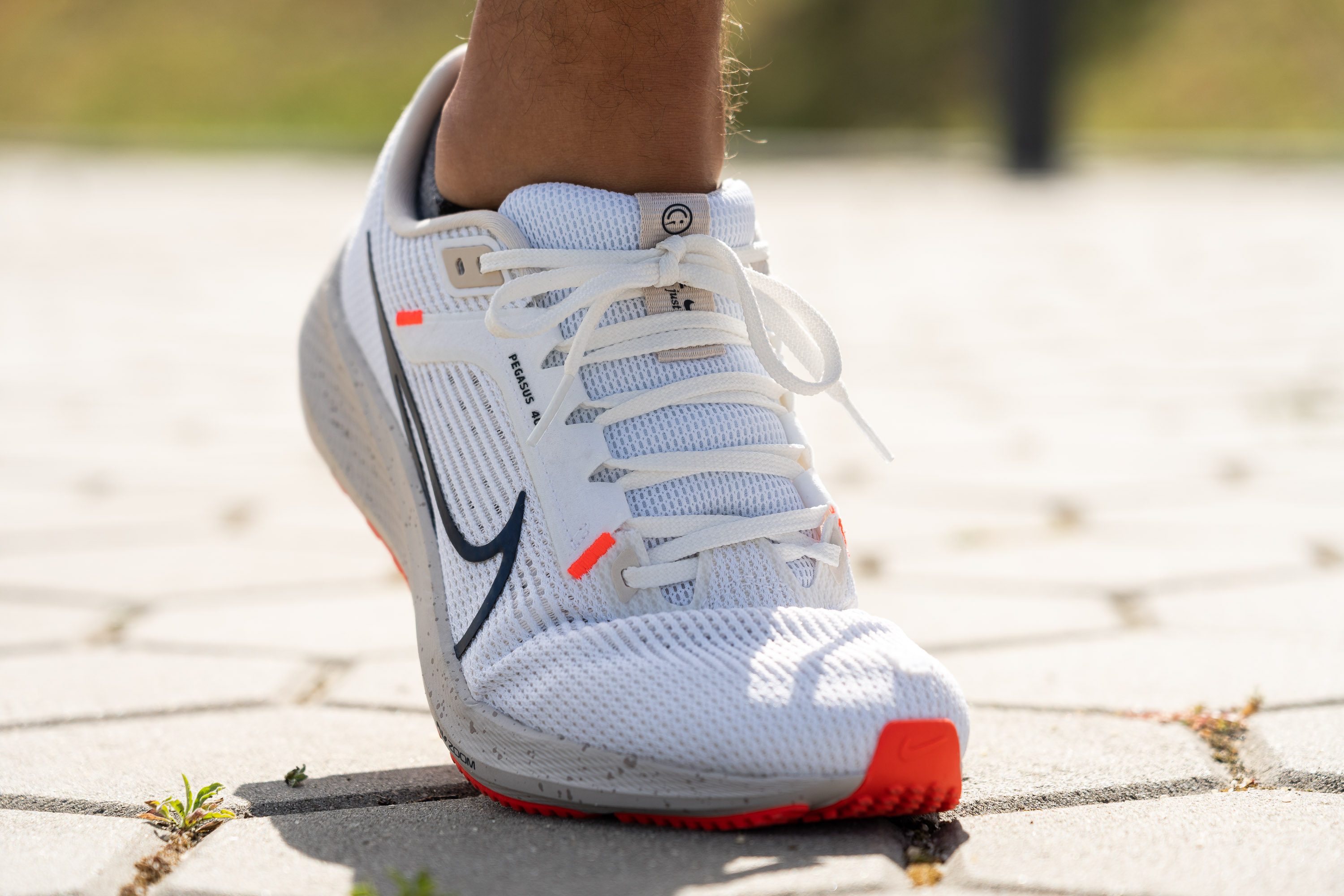
Traction / Grip
Traction test
Nike puts real effort into making the Pegasus an all-weather performer, perfect for runners who want one go-anywhere shoe.
We tested its outsole and found a 0.45 score in wet conditions, offering good grip in both dry and wet surfaces.
| Pegasus 40 | 0.45 |
| Average | 0.49 |
Outsole design
Nike sticks to its long-running design for the Pegasus 40 outsole, using full-length rubber with a waffle-like tread. The midfoot cutout lightens the shoe slightly, while the forefoot and heel show clear segmentation to promote smooth transitions and a touch of extra flex.
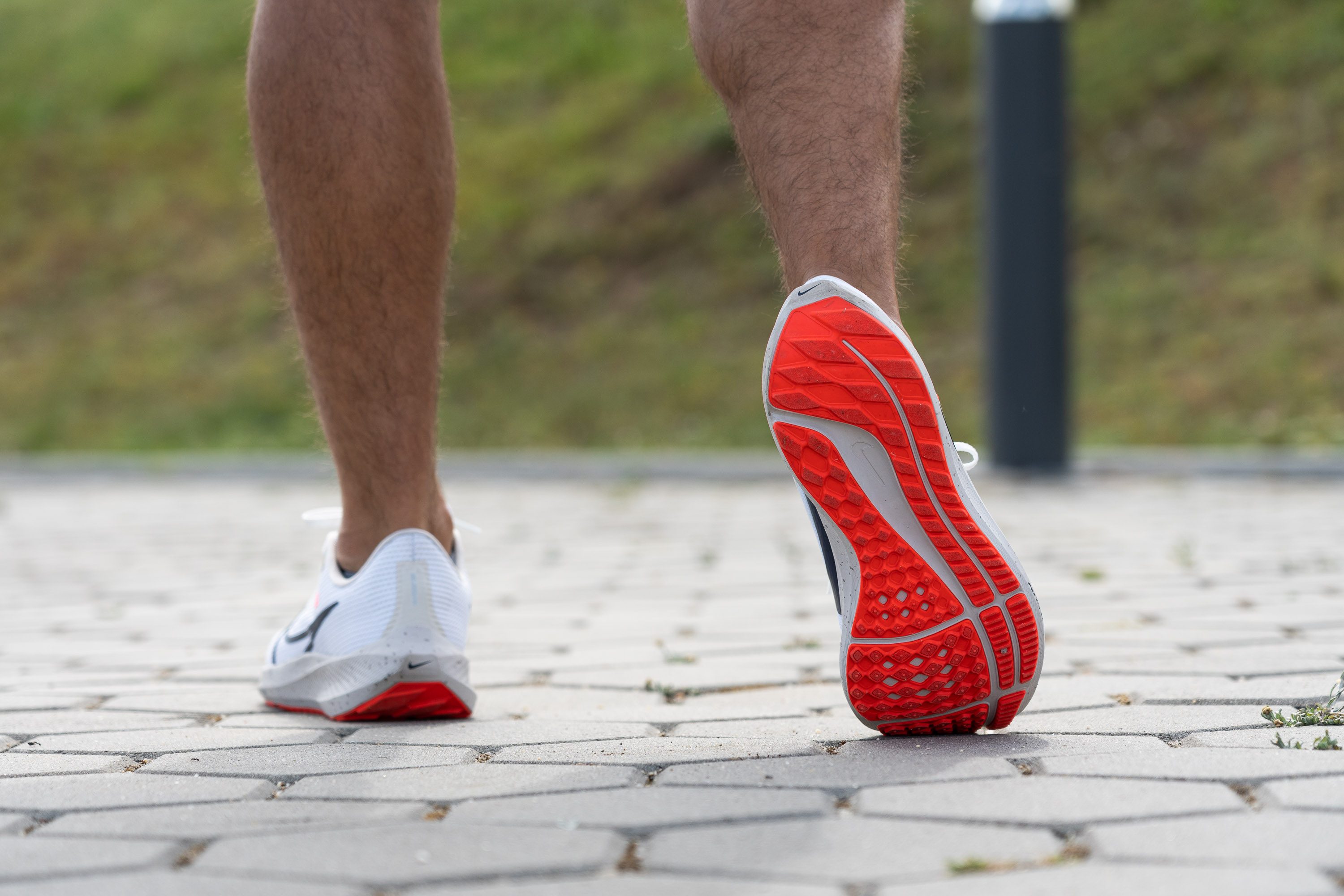
Flexibility / Stiffness
Multiple grooves along its length allow the shoe to bend and move more freely and create a more snappy and responsive ride.
Back in the lab, we confirmed that the Peg 40 is really malleable in our signature 30º bend test. The shoe required only 12.4N to bend it.
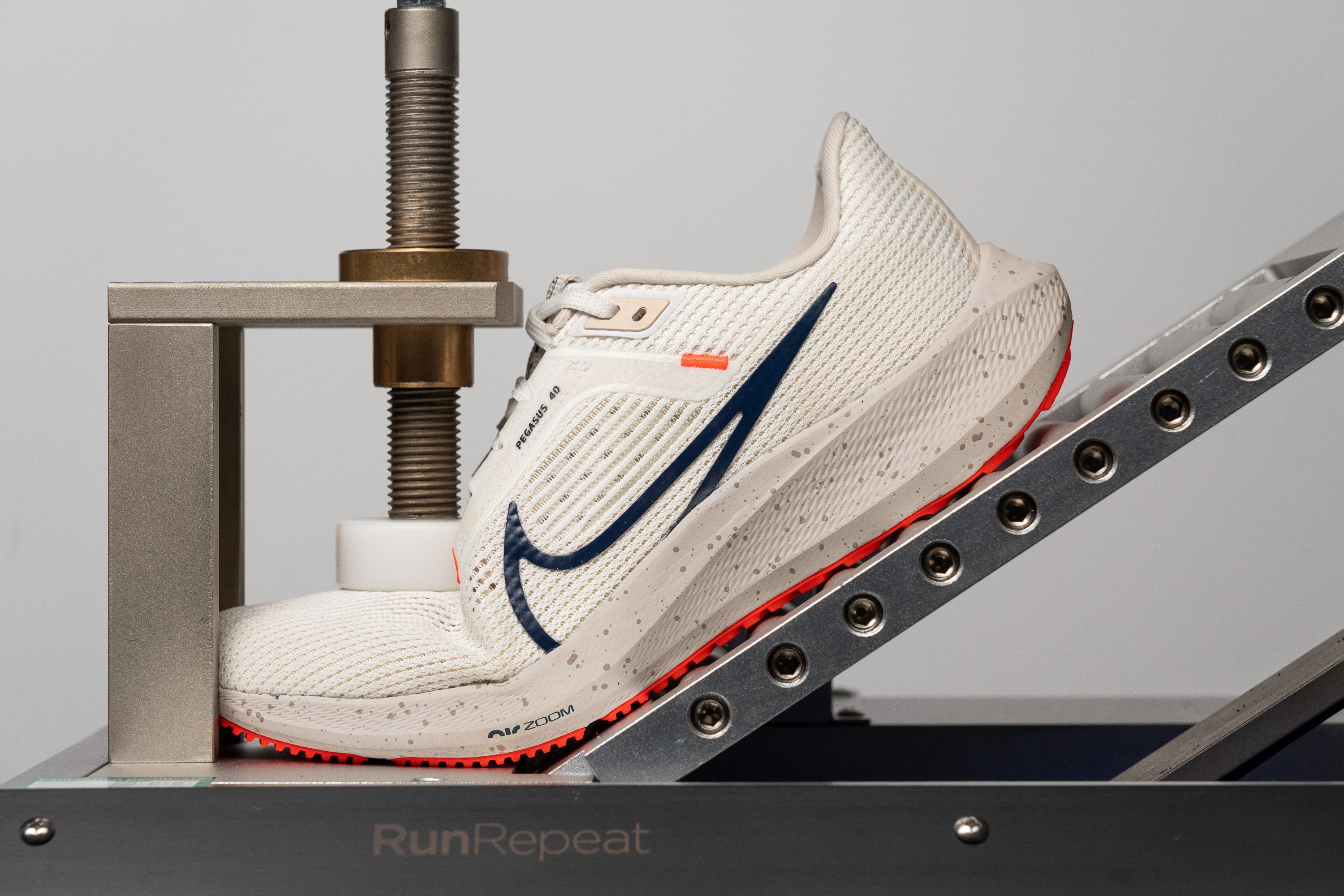
| Pegasus 40 | 12.4N |
| Average | 15.3N |
Weight
Tipping the scale at 9.7 oz (275g) in a men's US size 9, the Pegasus 40 is only a tiny bit heavier than road running shoes on average. Almost insignificantly so, judging by the daily trainer standards.
| Pegasus 40 | 9.7 oz (275g) |
| Average | 9.3 oz (264g) |
Breathability
The mesh upper in this new version looks slightly more porous than its predecessor’s. According to Nike, this is meant for better breathability.
Sorry, Nike, but this Pegasus is less breathable than its predecessor. Following our eye-popping breathability test, the v40 earned a just-average 3/5, while the Pegasus 39 secured a better-than-average 4/5 under the same conditions. Keep this in mind if you frequently run in warmer temperatures.
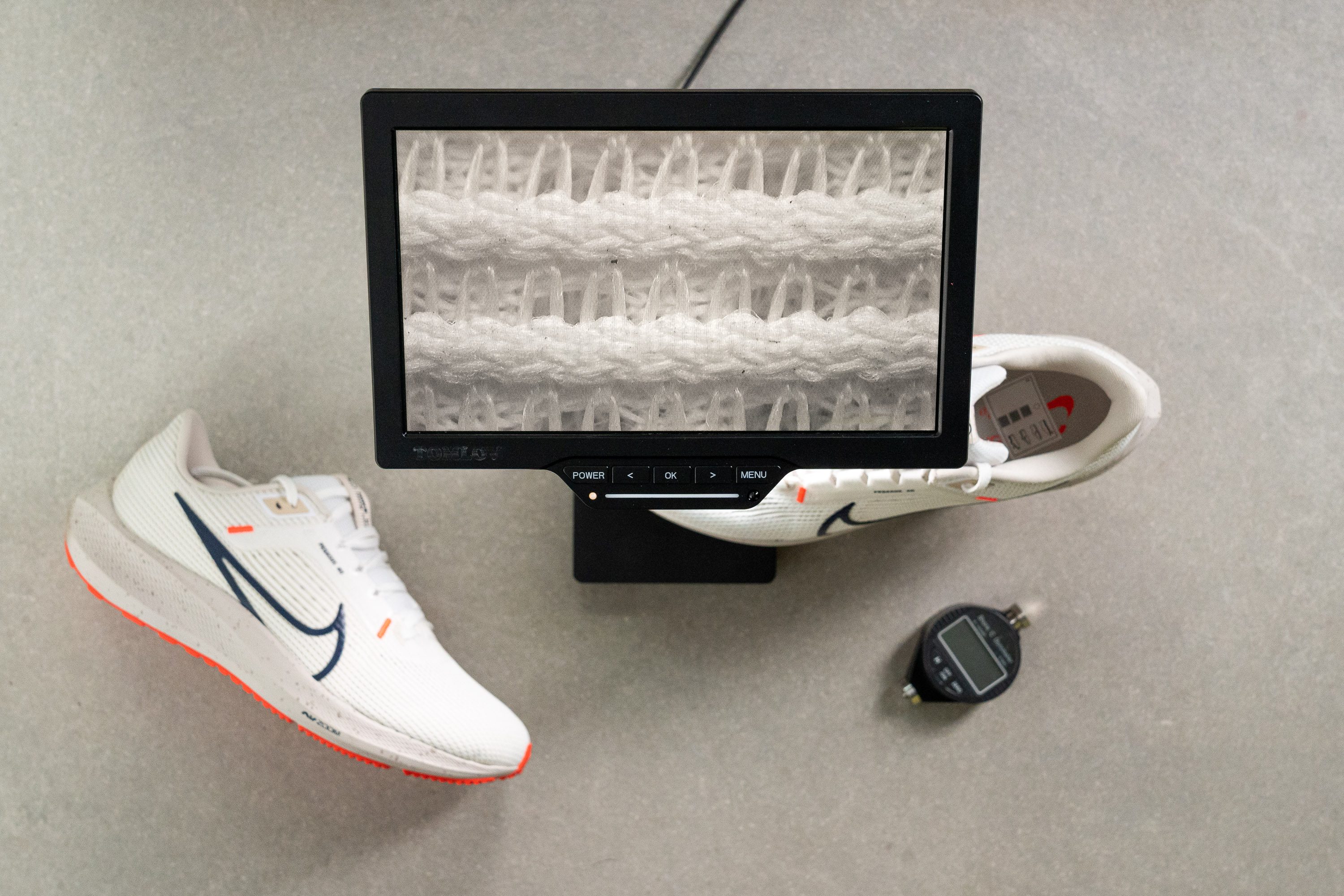
We love to validate our breathability test results with the microscope. As you can see, there is inadequate airflow resulting from a thick mesh layer lacking ventilation holes.
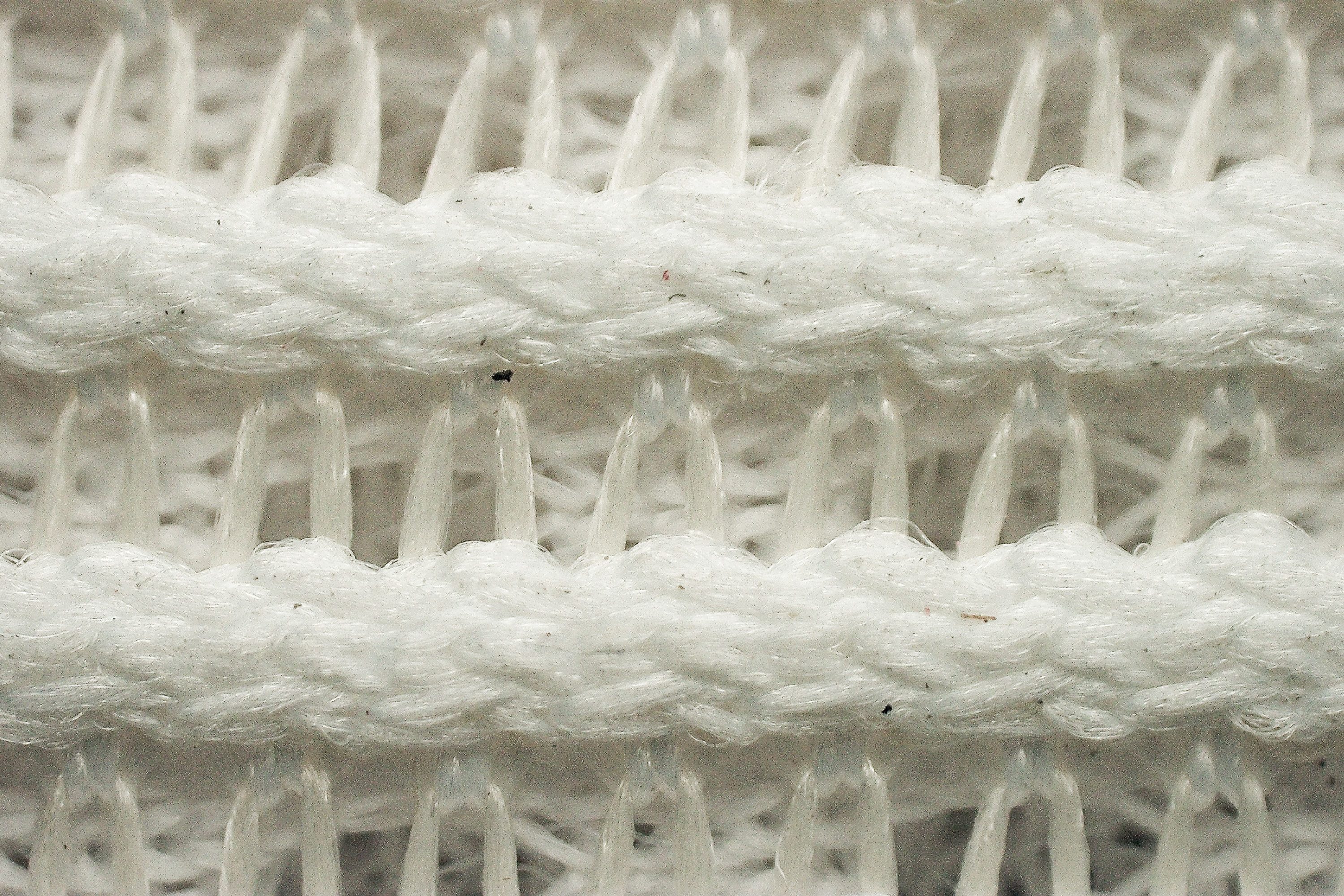
The same applies when the upper encounters light in our lab.
There’s also more padding now, especially around the heel, giving the shoe a more snug and substantial fit and feel to it. But if you prefer a plush upper experience, you will be pleasantly surprised.
Upon closer examination, we found that this new dual-layered upper is extremely padded, providing tons of comfort to our feet.
| Pegasus 40 | 3 |
| Average | 3.7 |
Stability
Lateral stability test
Although the React foam helps with stability and it's not as soft as ZoomX, this is not a shoe for pronators.
If you struggle with pronation and are in search of a daily trainer, the Saucony Guide 16 is a much better option for you.
Torsional rigidity
As befits a neutral shoe, the Pegasus 40 is pretty flexible in its core.
Twisting the shoe in our hands, we rated its torsional stiffness at 2 out of 5 (where 5 is the stiffest).
| Pegasus 40 | 2 |
| Average | 3.5 |
Heel counter stiffness
The same goes for the shoe's heel counter. It barely has any structure to it!
In a manual test, we also have it a 2 out of 5 for stiffness, making it softer and more flexible than average. This is not a shoe that gives a super sturdy heel clutch.
| Pegasus 40 | 2 |
| Average | 2.9 |
Midsole width - forefoot
What's more, the latest version of the Pegasus features a relatively narrow platform.
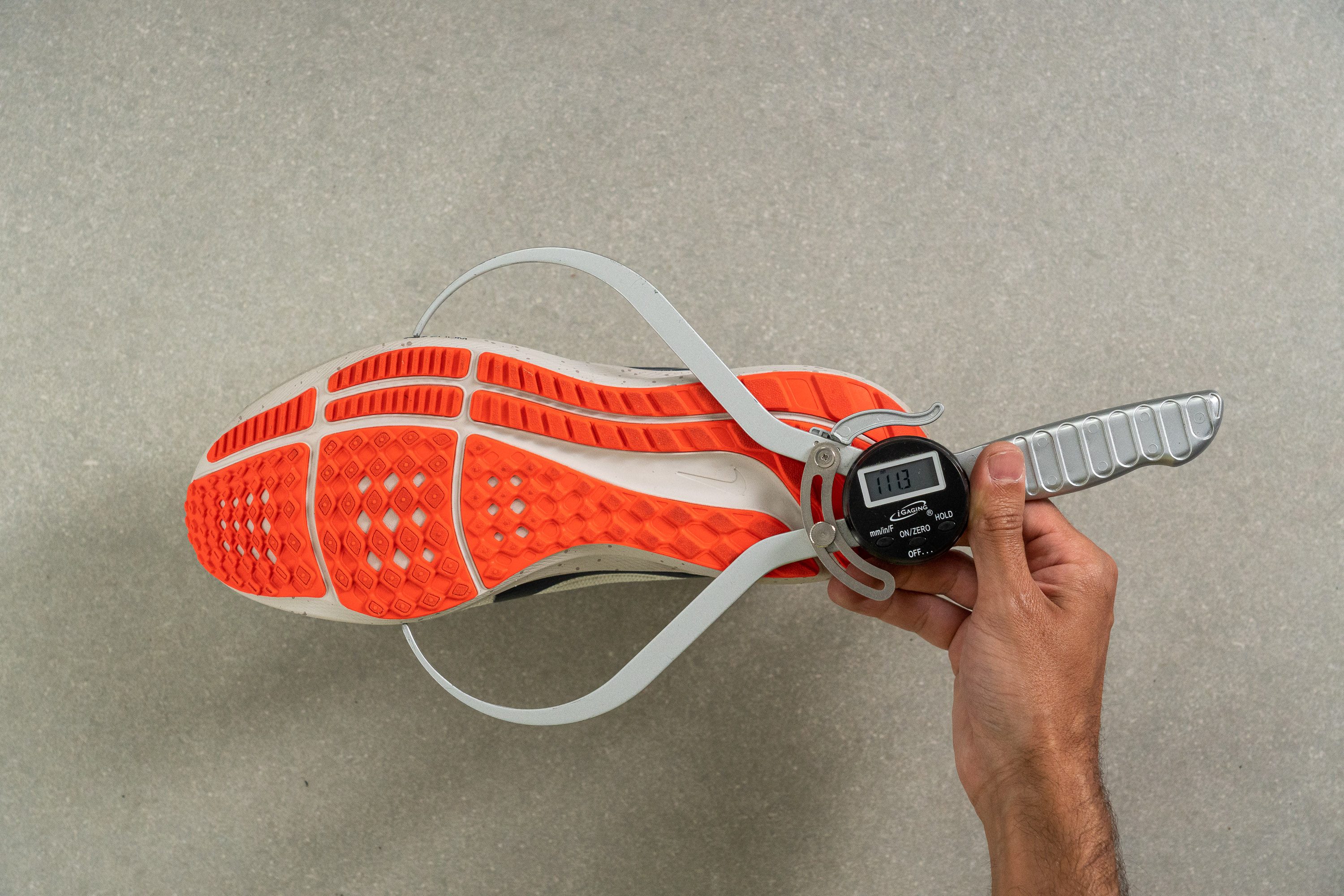
In the widest part of the forefoot, the Pegasus 40 came in at 111.3 mm which is a couple of millimeters narrower than average.
| Pegasus 40 | 111.3 mm |
| Average | 114.4 mm |
Midsole width - heel
In the heel, the Pegasus gets even more catastrophically narrow. In the widest part of its midsole in the help, we only measured 83.7 mm. That's over 6 mm narrower than average!
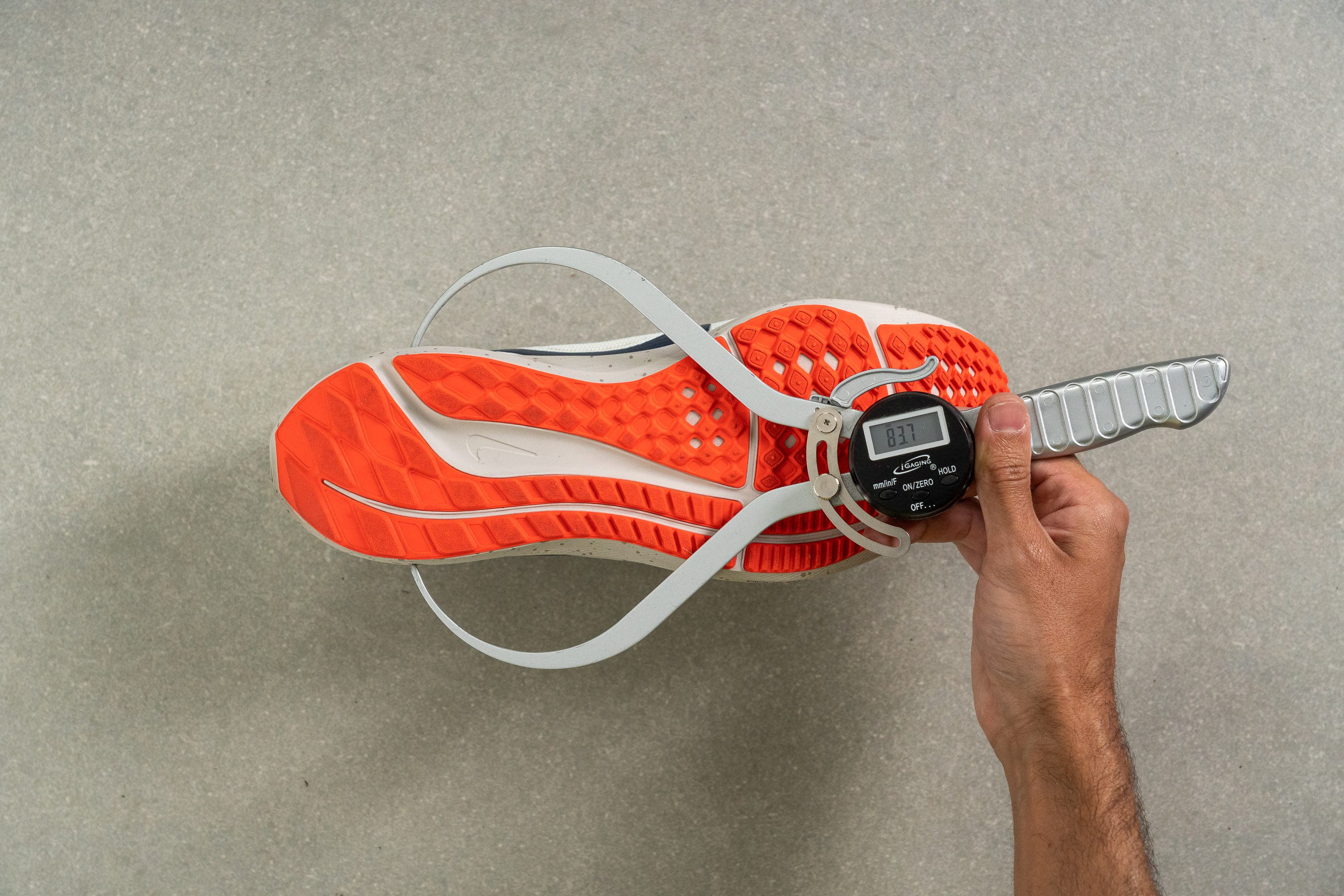
Surprisingly, it's even way narrower than the racing-oriented Alphafly Next% 2, which boasts a 5% wider forefoot and a 14% wider heel. That's quite surprising!
| Pegasus 40 | 83.7 mm |
| Average | 90.6 mm |
Durability
Toebox durability
One of the classic features that made the Pegasus a shoe worth of 40 editions is that it's built like a tank. So, how did it resist our Dremel test?
In this test, we apply the exact same force and RPMs to every shoe for 4 seconds. What we found is that the Pegasus 40 delivered an excellent result. As you can see in the video above and the photo below, the abrasion wasn't enough to completely break the upper, which is the most common result in every road running shoe.
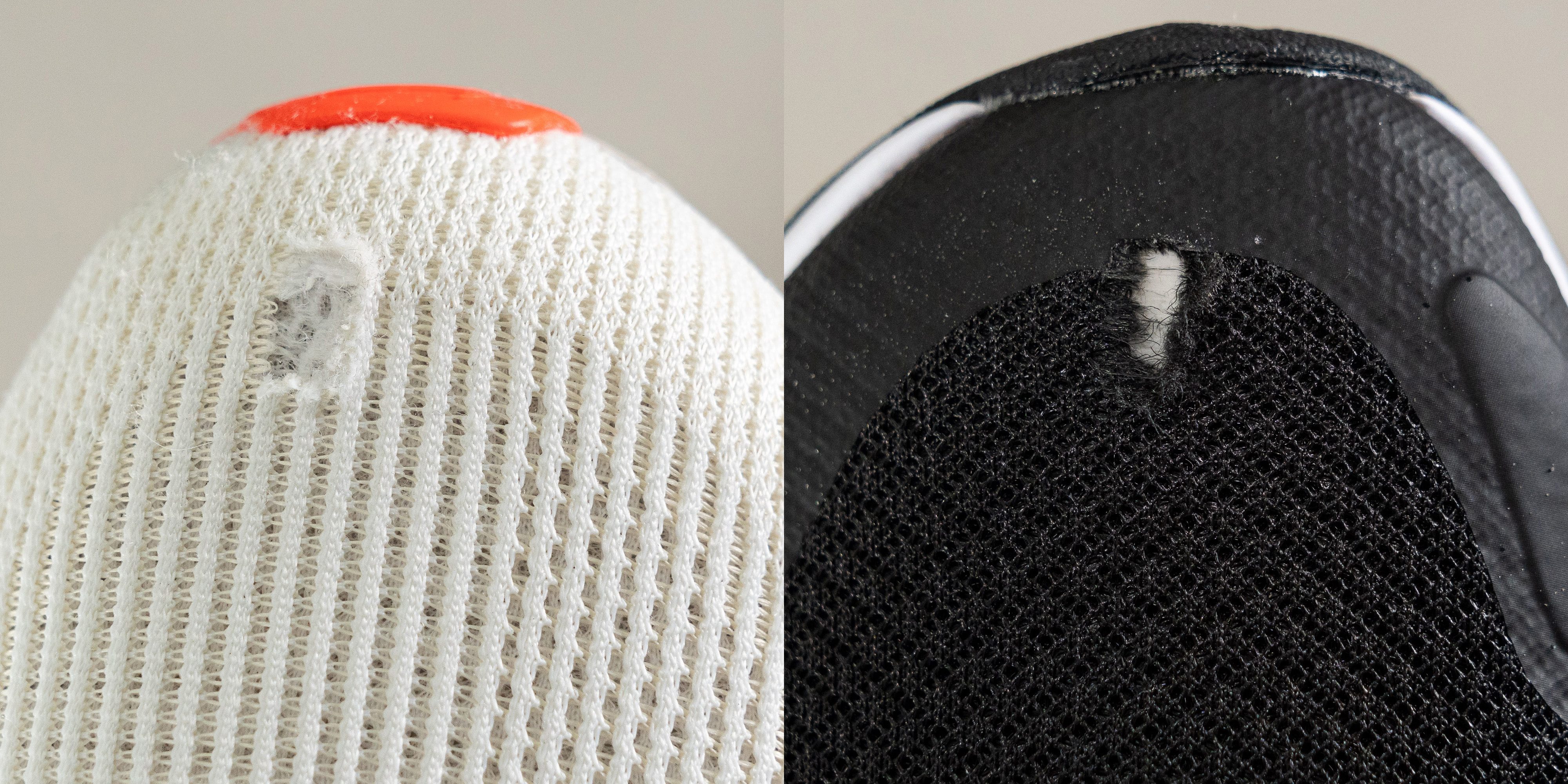
The thick and dual-layered mesh led us to believe that it would be nearly impossible to break this upper. For those of you who tend to make holes in your shoes with your big toe or pinky toe, this is your daily trainer!
| Pegasus 40 | 3 |
| Average | 2.6 |
Outsole thickness
Not to mention a solid 3.4 mm layer of rubber protecting the bottom of this Nike running shoe. It has the same thickness as the average road shoe but it's the hardness that gives it that edge.
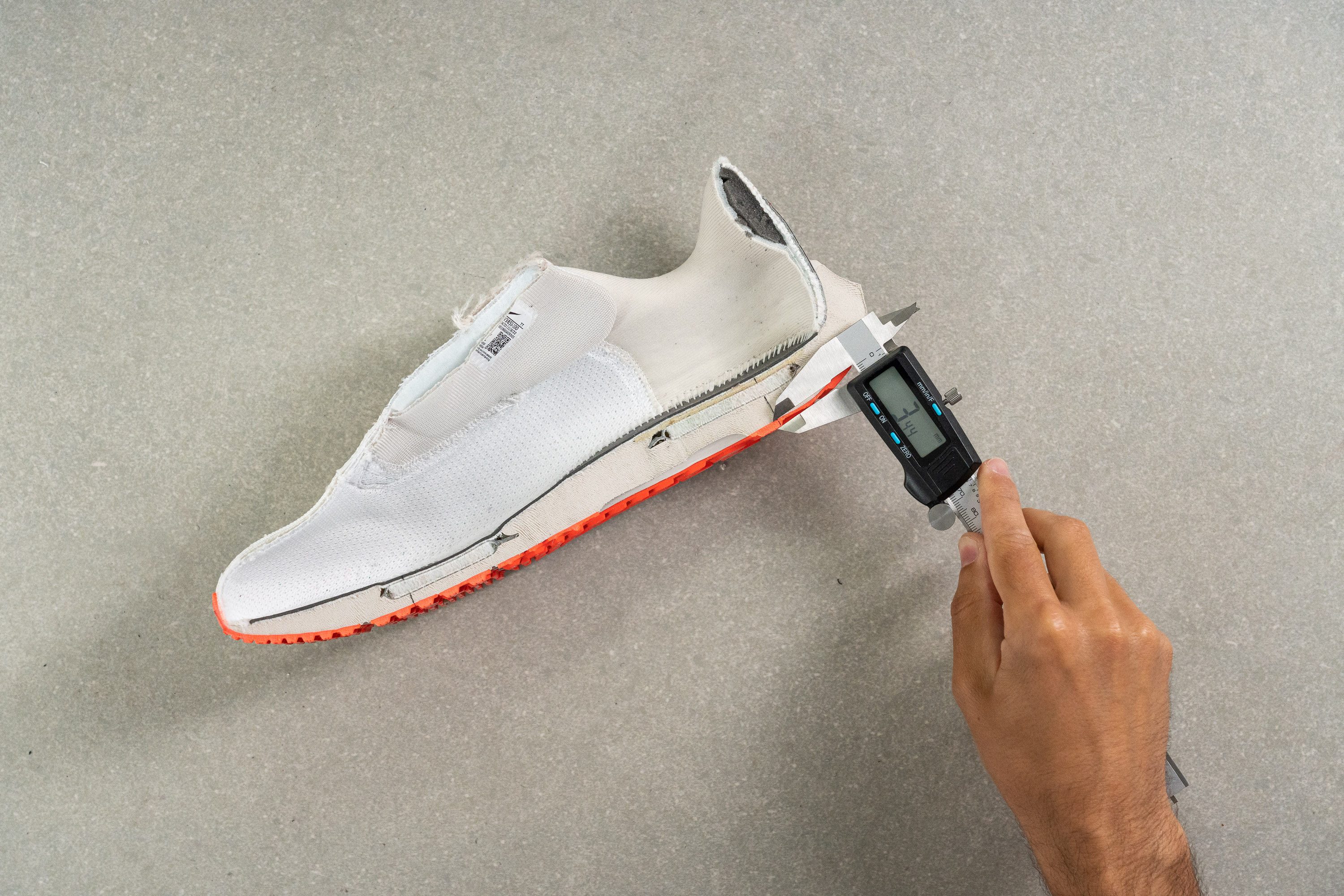
| Pegasus 40 | 3.4 mm |
| Average | 3.2 mm |
Misc
Insole thickness
Regarding the insole, it's classic Pegasus-style—in other words, quite average. While the median thickness of 200+ insoles we've measured is 4.4 mm, the Pegasus 40 has a 4.3 mm insole. Just what you should expect from this shoe.
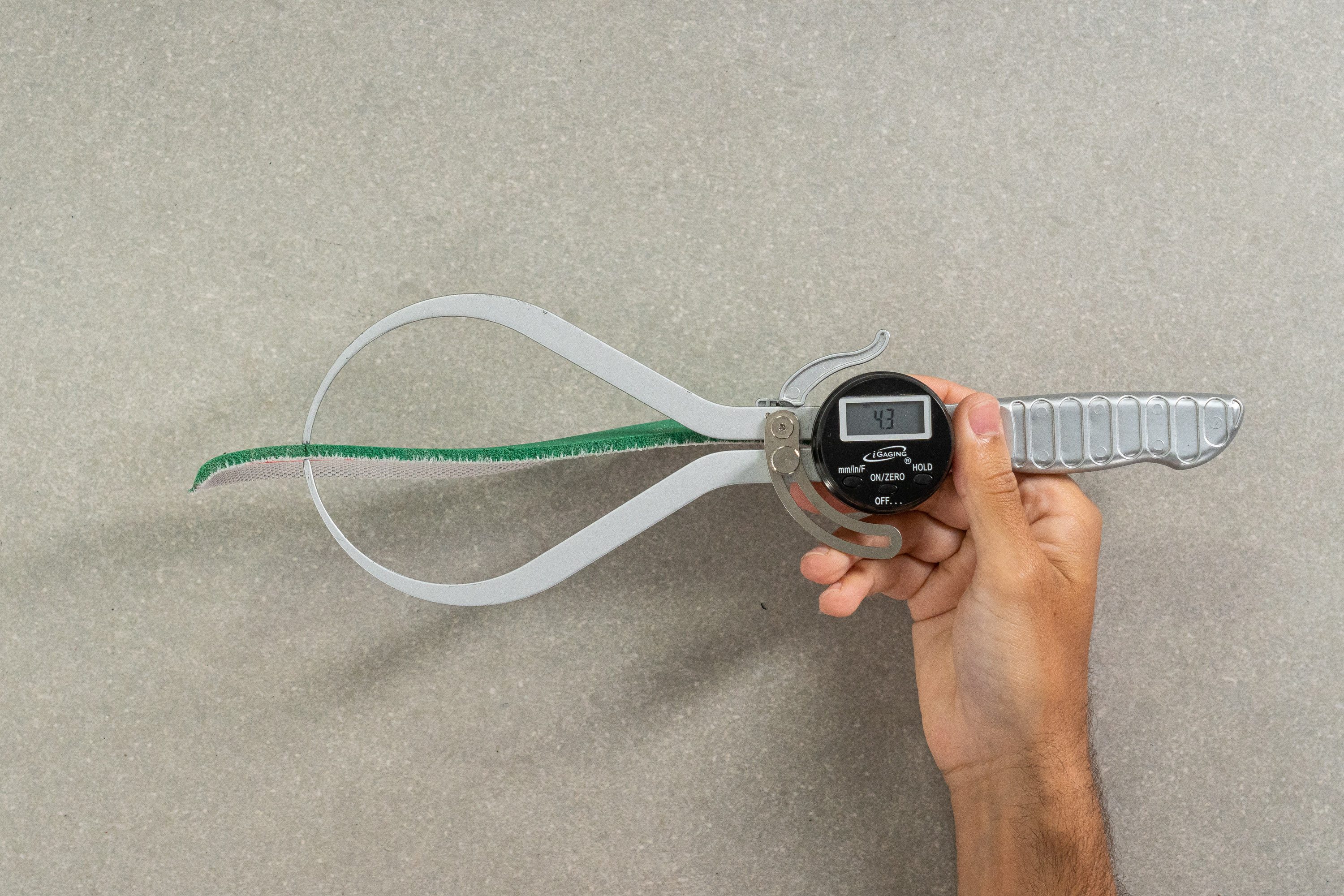
| Pegasus 40 | 4.3 mm |
| Average | 4.5 mm |
Midsole softness in cold (%)
The midsole also suffers in winter, although it outperforms the average shoe. The TPE foam does a great job and gets 19.1% firmer, while the median of all lab-tested shoes is 26.7%. Not bad!
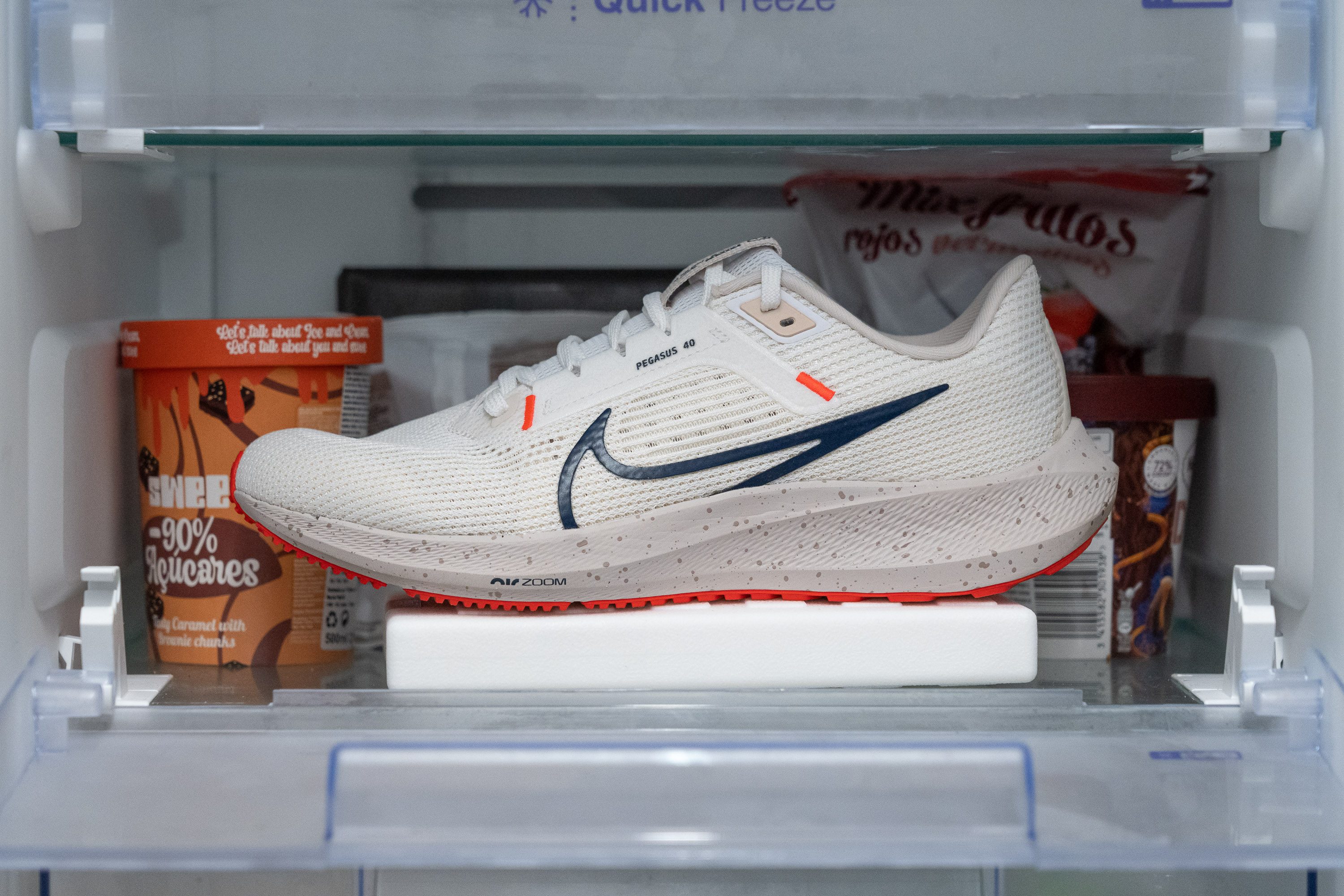
| Pegasus 40 | 19% |
| Average | 24% |
Reflective elements
Yes, we have to acknowledge that the Pegasus 40 features reflective elements, but are they sufficient?
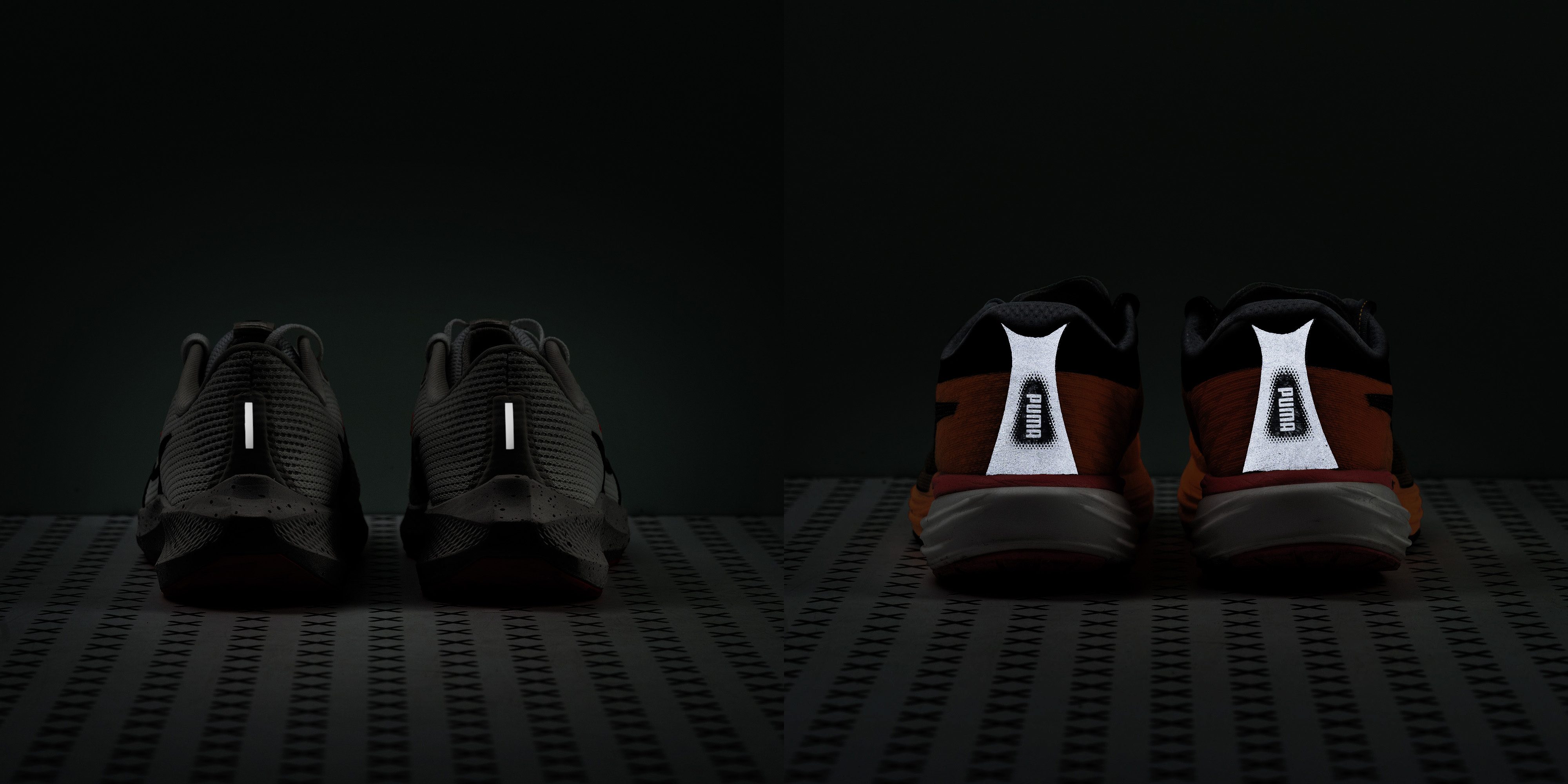
Well, it's evident that when compared to another reflective shoe, like the Puma in the comparison picture, Nike could have done a bit better.
| Pegasus 40 | Yes |
Tongue padding
Although the shoe's tongue remains quite comfortable and padded, our measurements actually reveal that it is 16% thinner than the one in the v39.
But worry not, at 8.6 mm, it is almost 3 mm thicker than average!
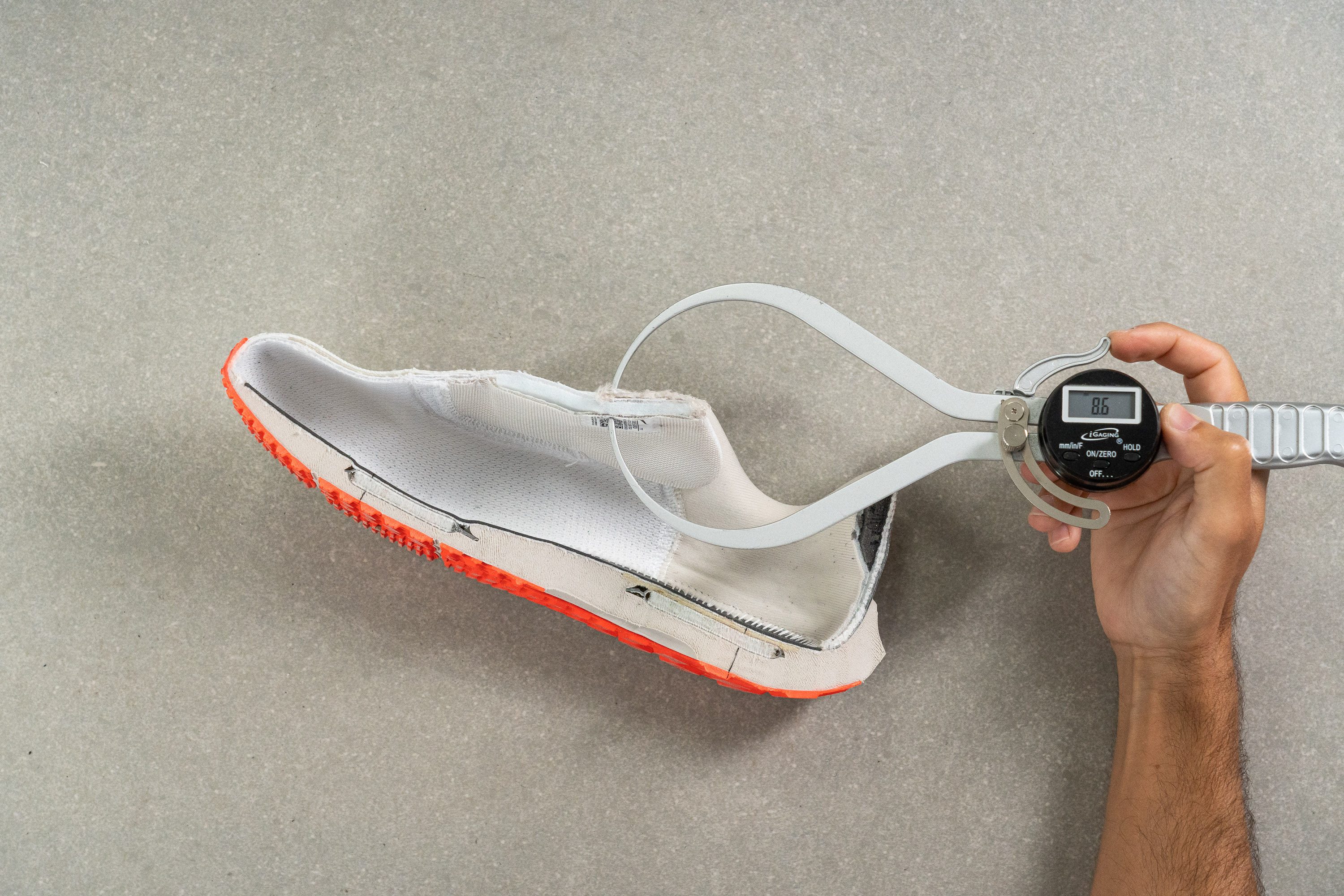
| Pegasus 40 | 8.6 mm |
| Average | 5.7 mm |
Tongue: gusset type
Add in the fully gusseted tongue to the shoe's close-fitting upper and the result is a really secure and consistent lockdown.
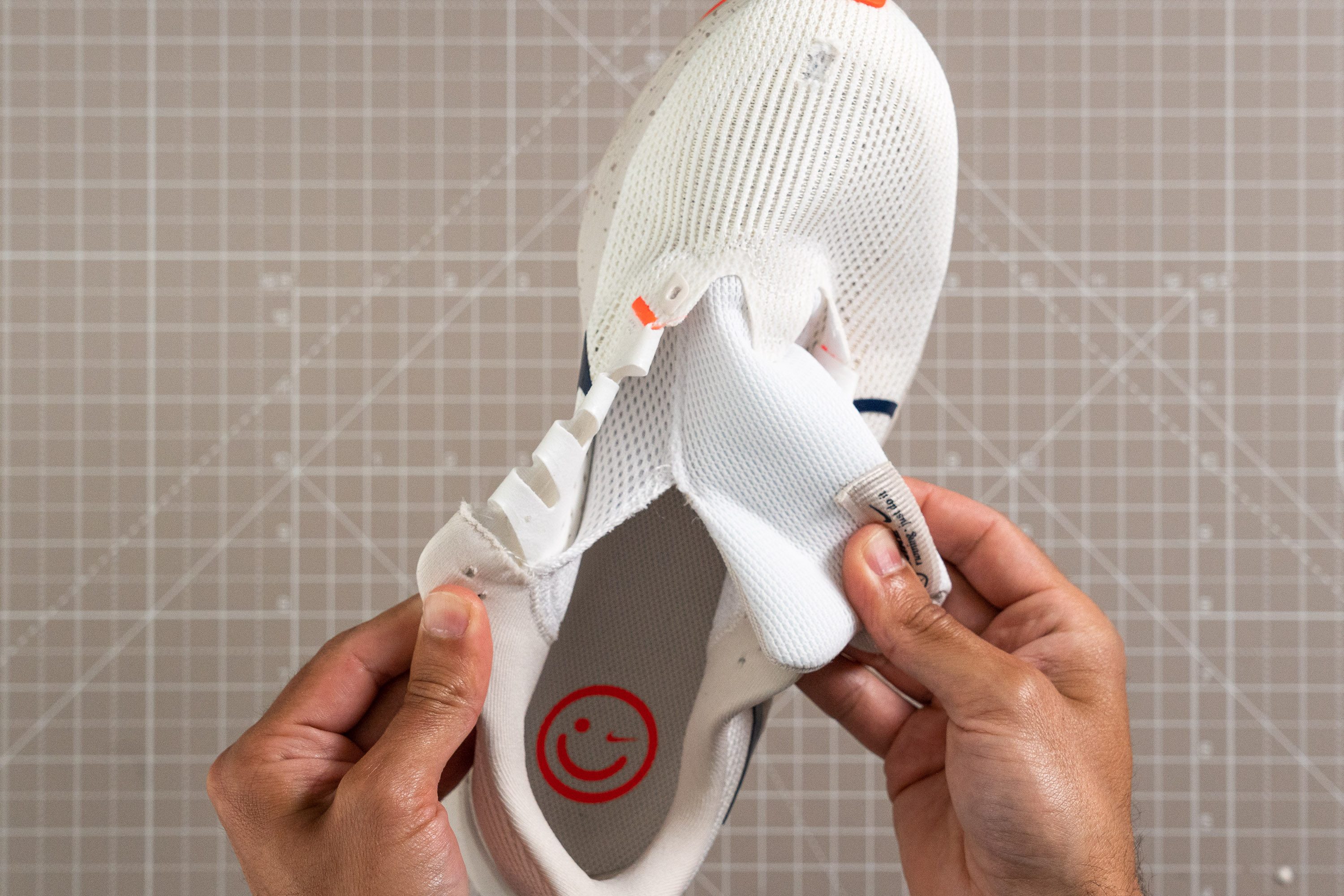
| Pegasus 40 | Both sides (full) |
Pegasus 40: reliable choice or falling behind?
The Nike Pegasus series has maintained its popularity and relevance over the years, becoming the best-selling model of all time. Achieving such extraordinary success requires a mix of customer satisfaction, strong brand reputation, fair pricing, and minimal drawbacks.
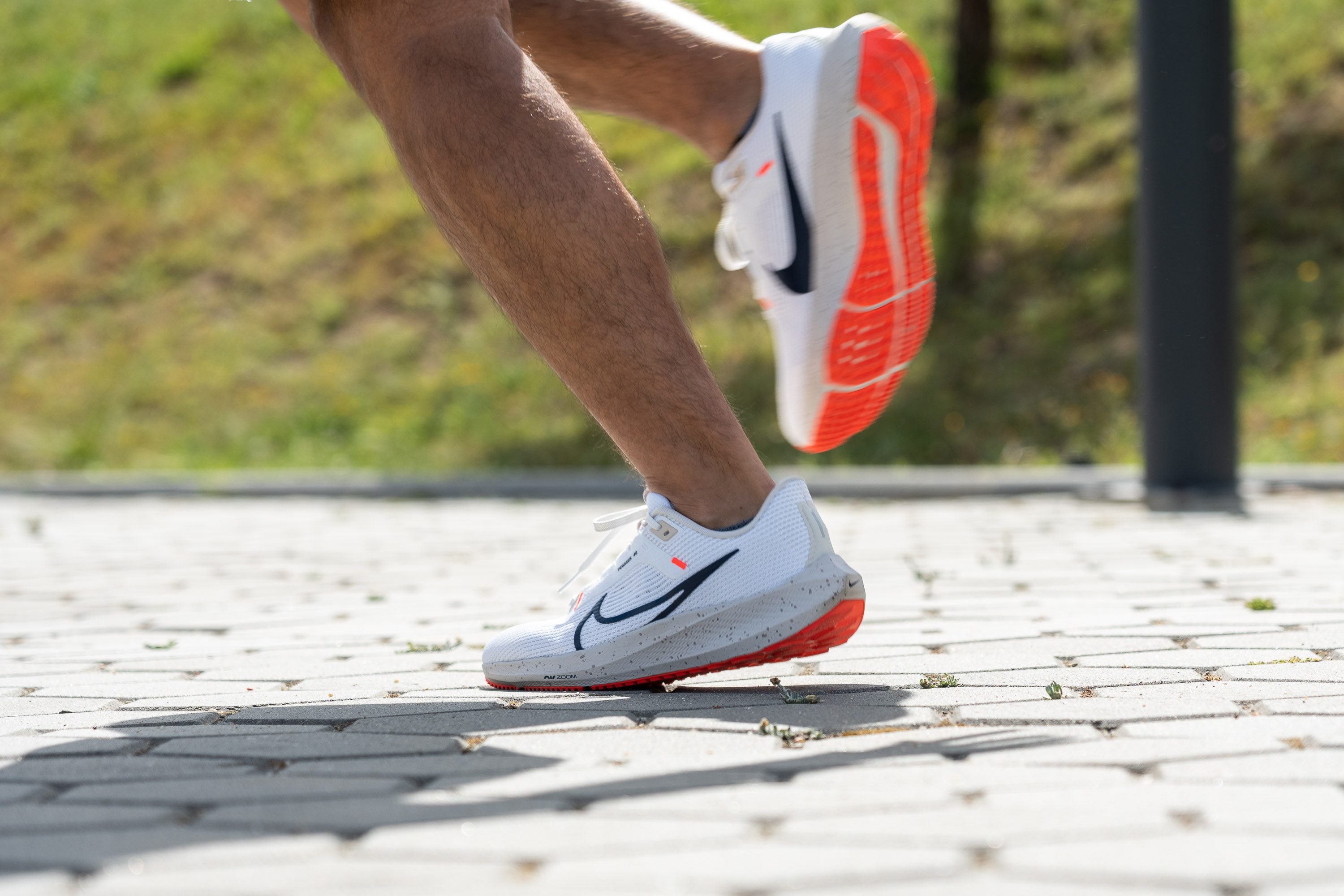
Consequently, the Pegasus 40 follows the same successful formula, with slight improvements but also lags a bit behind competitors like the ASICS Novablast 3.
Moreover, the difference between the Pegasus 40 and its predecessor isn't significant, so if you're all-in with Nike, on a budget, and don't mind wearing last year's model, the Pegasus 39 would be an interesting choice.
